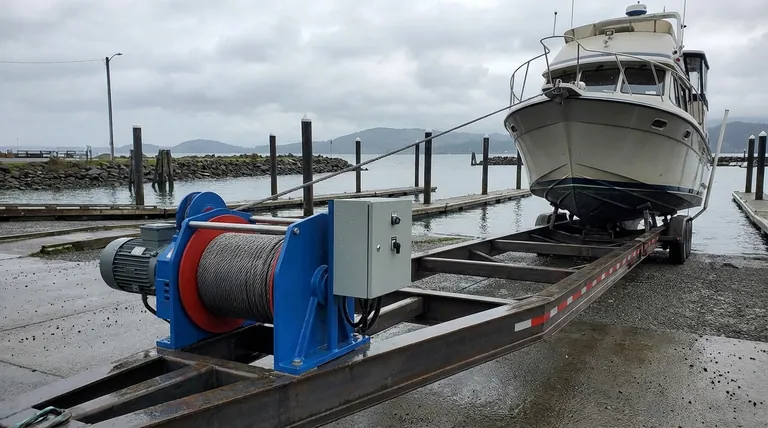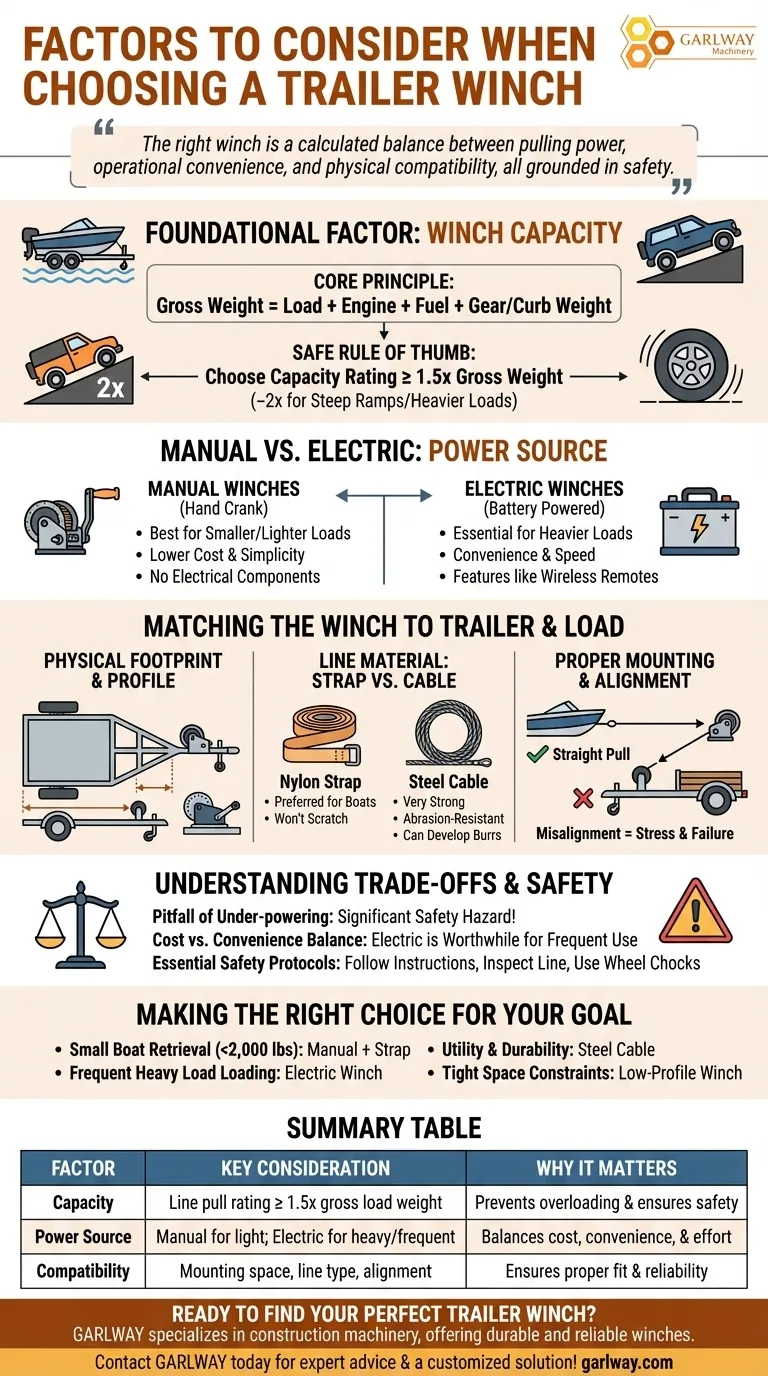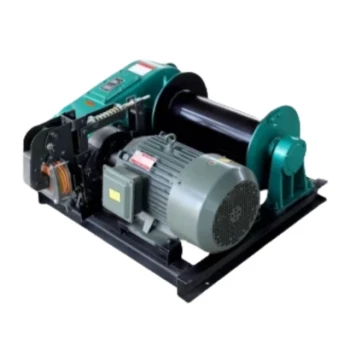When choosing a trailer winch, the most critical factors are the weight of the load you intend to pull, the type of winch (manual or electric), and its compatibility with your specific trailer. Selecting a winch with a capacity well above your load's weight is the primary principle for ensuring safe and effective operation.
The right winch is not simply the strongest one you can find. It is a calculated balance between pulling power, operational convenience, and physical compatibility with your equipment, all grounded in the principle of safety.

Foundational Factor: Calculating Winch Capacity
Your first and most important decision revolves around the winch's "line pull rating," which is its maximum pulling capacity. This number must safely exceed the demands of your load.
The Core Principle: Gross Weight
Start with the gross weight of the object you are pulling. For a boat, this includes the hull, engine, fuel, water, and all gear. For a vehicle, this is its curb weight. This is your baseline number.
Factoring in Resistance and Incline
You are never pulling a dead weight on a frictionless surface. You must account for the additional force required to overcome rolling resistance (for wheeled vehicles) and gravity (pulling up an incline, like a boat ramp).
A conservative and safe rule of thumb is to choose a winch with a capacity rating of at least 1.5 times the gross weight of your boat or vehicle. For steep ramps or heavier loads, a 2x or greater multiplier is even better.
Manual vs. Electric: Choosing Your Power Source
The next major choice is how the winch will be powered. This decision impacts cost, convenience, and the types of loads you can handle.
The Case for Manual Winches
Manual winches are operated with a hand crank. They are an excellent choice for smaller, lighter loads, such as small aluminum fishing boats or jet skis. Their primary benefits are lower cost and simplicity, with no electrical components to fail.
The Advantage of Electric Winches
Electric winches are powered by your tow vehicle's battery. They are essential for heavier loads where manual cranking would be impractical or impossible. They offer significant convenience, speed, and safety, often including features like wireless remotes that allow you to operate the winch from a distance.
Matching the Winch to Your Trailer and Load
A powerful winch is useless if it doesn't fit your trailer or work well with your specific cargo. Physical compatibility is a non-negotiable step.
Physical Footprint and Profile
Consider the available space on your trailer's tongue. Winches come in different physical sizes, sometimes referred to as "profiles." You must ensure the winch's mounting pattern and overall dimensions will fit securely without interfering with other components.
Line Material: Strap vs. Cable
The line that does the pulling is also a key choice.
- Straps: Wide, flat nylon straps are preferred for boats as they won't scratch the gelcoat or hull.
- Steel Cable: Very strong and abrasion-resistant, but it can develop sharp burrs over time and can damage sensitive surfaces. It's more common for utility or car trailers.
Proper Mounting and Alignment
For the winch to work correctly and safely, it must be mounted properly. The line should pull straight from the winch to the attachment point (like a boat's bow eye). Misalignment puts immense stress on the winch and the trailer frame, leading to premature failure.
Understanding the Trade-offs and Safety Imperatives
Choosing a winch involves balancing competing factors and prioritizing safety above all else.
The Pitfall of Under-powering
Never try to save money by buying a winch that is underrated for your load. An overloaded winch is a significant safety hazard. It can fail catastrophically, causing damage to your equipment and posing a serious risk of injury.
The Cost vs. Convenience Balance
While an electric winch is more expensive, its value becomes clear with frequent use or heavy loads. The reduction in physical effort and time spent loading can be a worthwhile investment. For infrequent use with light loads, a manual winch is a perfectly logical, budget-friendly choice.
Essential Safety Protocols
Always read and follow the manufacturer's instructions. Regularly inspect your winch strap or cable for wear and tear. Use wheel chocks to stabilize the trailer during operation and never leave a winch unattended while under load.
Making the Right Choice for Your Goal
Your specific application should guide your final decision.
- If your primary focus is retrieving a small boat (under 2,000 lbs): A quality manual winch with a strap is likely the most practical and cost-effective solution.
- If your primary focus is loading a car or heavy boat frequently: An electric winch is a necessary investment for its power, speed, and safety benefits.
- If your primary focus is utility and durability: A winch with a steel cable may offer better resistance to abrasion when pulling diverse or rough materials.
- If you have tight space constraints on your trailer: Carefully measure the mounting area and select a low-profile winch designed for a compact fit.
By systematically evaluating your load, trailer, and usage needs, you can select a winch that provides years of safe and reliable service.
Summary Table:
| Factor | Key Consideration | Why It Matters |
|---|---|---|
| Capacity | Line pull rating ≥ 1.5x gross load weight | Prevents overloading and ensures safety |
| Power Source | Manual for light loads; Electric for heavy/frequent use | Balances cost, convenience, and effort |
| Compatibility | Mounting space, line type (strap/cable), alignment | Ensures proper fit and functional reliability |
Ready to Find Your Perfect Trailer Winch?
GARLWAY specializes in construction machinery, offering durable and reliable winches, concrete mixers, and batching plants tailored for construction companies and contractors globally.
Let us help you select a winch that matches your load requirements and operational needs—ensuring safety, efficiency, and long-term value.
Contact GARLWAY today for expert advice and a customized solution!
Visual Guide

Related Products
- Best 18000 Pound Drum Anchor Trailer Winch
- Warn Winch Windlass Boat Trailer Winch
- 12000 lb Electric Boat Trailer Winch with Windlass Anchor Warn
- Electric 120V Boat Winch by Badlands
- 12000 lb Heavy Duty Electric Boat Winch
People Also Ask
- How do winches support drilling and water well industries? Unlock Essential Power & Control
- Why is a windlass considered convenient for sailors? Effortless Anchoring for Safety & Control
- How does a hoisting device convert power into lifting or lowering force? Master the Mechanics of Load Movement
- How do mechanical winches differ from electric winches? Choose the Right Tool for Your Job
- What should you check about the hook latch before using the winch? Ensure a Safe and Efficient Winching Operation
- What are the main components of a towing winch? The Essential Guide to Its Powerful Core Systems
- What are the key components of a marine hydraulic winch? A Guide to Its Powerful Core Systems
- What should be considered when mounting a winch on an enclosed trailer? Ensure a Safe, Straight Pull



















